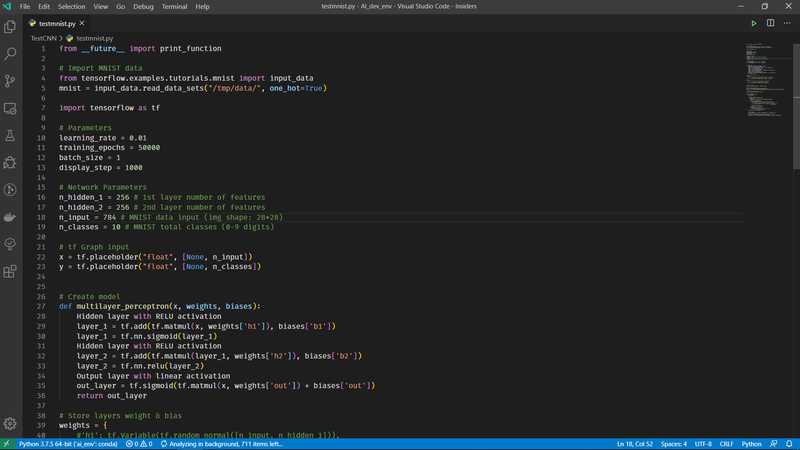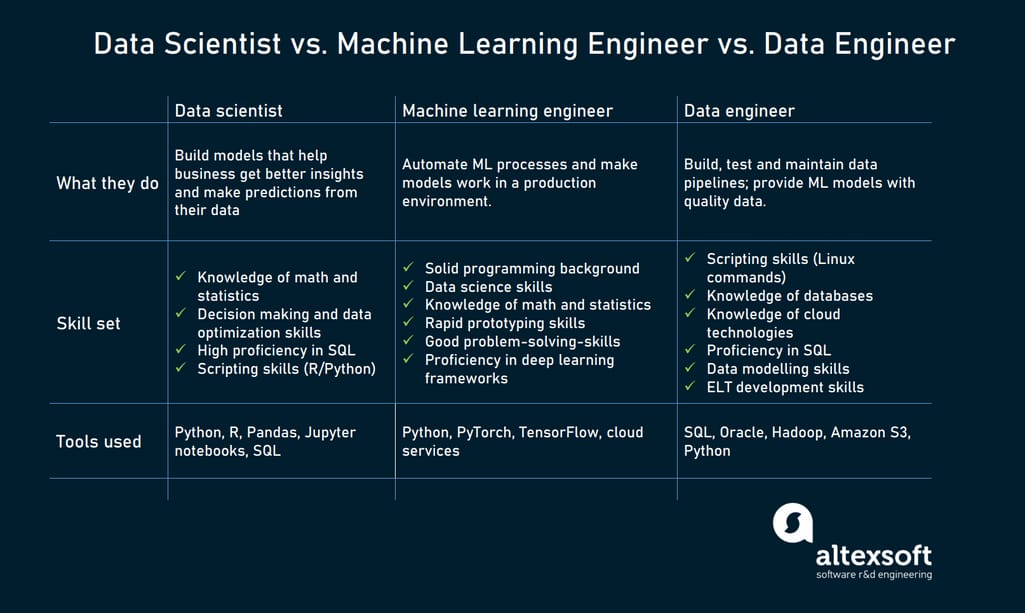All Categories
Featured
Table of Contents
- – Unknown Facts About 7 Best Machine Learning Co...
- – Our Embarking On A Self-taught Machine Learnin...
- – The 15-Second Trick For What Do I Need To Lea...
- – The Ultimate Guide To Machine Learning In Pro...
- – Things about Aws Machine Learning Engineer N...
- – Top Guidelines Of How To Become A Machine Le...
My PhD was the most exhilirating and laborious time of my life. All of a sudden I was surrounded by people who can solve tough physics questions, recognized quantum auto mechanics, and could come up with interesting experiments that obtained released in leading journals. I really felt like a charlatan the whole time. I dropped in with a great team that urged me to explore things at my very own speed, and I invested the following 7 years finding out a ton of things, the capstone of which was understanding/converting a molecular dynamics loss function (consisting of those shateringly discovered analytic derivatives) from FORTRAN to C++, and writing a slope descent routine straight out of Mathematical Dishes.
I did a 3 year postdoc with little to no artificial intelligence, just domain-specific biology stuff that I didn't discover interesting, and finally handled to get a task as a computer system scientist at a nationwide laboratory. It was a great pivot- I was a principle detective, indicating I can make an application for my very own gives, write papers, and so on, however didn't need to show courses.
Unknown Facts About 7 Best Machine Learning Courses For 2025 (Read This First)
I still really did not "get" device discovering and wanted to function somewhere that did ML. I tried to obtain a task as a SWE at google- went through the ringer of all the hard concerns, and eventually got refused at the last step (thanks, Larry Page) and mosted likely to help a biotech for a year before I ultimately managed to get hired at Google during the "post-IPO, Google-classic" age, around 2007.
When I reached Google I quickly checked out all the tasks doing ML and found that than advertisements, there actually wasn't a lot. There was rephil, and SETI, and SmartASS, none of which appeared even remotely like the ML I wanted (deep neural networks). So I went and concentrated on various other things- discovering the dispersed technology below Borg and Colossus, and understanding the google3 stack and production settings, generally from an SRE perspective.

All that time I 'd invested in artificial intelligence and computer system framework ... mosted likely to composing systems that packed 80GB hash tables into memory just so a mapmaker might compute a little component of some slope for some variable. Regrettably sibyl was really a horrible system and I got begun the group for informing the leader properly to do DL was deep semantic networks above performance computing hardware, not mapreduce on inexpensive linux cluster makers.
We had the data, the formulas, and the calculate, simultaneously. And even much better, you didn't require to be inside google to take benefit of it (except the huge information, and that was changing swiftly). I comprehend enough of the math, and the infra to ultimately be an ML Engineer.
They are under intense pressure to obtain outcomes a few percent much better than their collaborators, and after that when released, pivot to the next-next thing. Thats when I created among my laws: "The greatest ML models are distilled from postdoc tears". I saw a couple of individuals break down and leave the industry completely simply from working with super-stressful tasks where they did excellent job, however just reached parity with a rival.
Charlatan syndrome drove me to overcome my imposter disorder, and in doing so, along the means, I discovered what I was chasing after was not actually what made me pleased. I'm far a lot more pleased puttering regarding utilizing 5-year-old ML technology like things detectors to improve my microscope's capacity to track tardigrades, than I am trying to end up being a well-known scientist who uncloged the tough issues of biology.
Our Embarking On A Self-taught Machine Learning Journey Ideas

I was interested in Maker Understanding and AI in college, I never had the possibility or persistence to seek that interest. Now, when the ML field expanded significantly in 2023, with the most current advancements in large language designs, I have a horrible longing for the road not taken.
Scott speaks regarding how he finished a computer system science degree just by adhering to MIT educational programs and self examining. I Googled around for self-taught ML Engineers.
At this factor, I am not exactly sure whether it is feasible to be a self-taught ML designer. The only means to figure it out was to try to try it myself. Nevertheless, I am positive. I intend on enrolling from open-source training courses available online, such as MIT Open Courseware and Coursera.
The 15-Second Trick For What Do I Need To Learn About Ai And Machine Learning As ...
To be clear, my objective below is not to develop the following groundbreaking model. I just intend to see if I can obtain an interview for a junior-level Equipment Learning or Data Engineering work after this experiment. This is simply an experiment and I am not trying to shift right into a duty in ML.

I intend on journaling concerning it weekly and documenting every little thing that I research study. Another please note: I am not starting from scrape. As I did my undergraduate degree in Computer system Engineering, I understand several of the principles needed to pull this off. I have strong history understanding of single and multivariable calculus, linear algebra, and stats, as I took these courses in college regarding a decade back.
The Ultimate Guide To Machine Learning In Production
I am going to concentrate mostly on Device Understanding, Deep learning, and Transformer Architecture. The objective is to speed run through these initial 3 training courses and get a solid understanding of the fundamentals.
Since you've seen the course recommendations, here's a fast overview for your knowing machine discovering trip. First, we'll touch on the requirements for many maker discovering training courses. Advanced courses will need the adhering to knowledge before starting: Linear AlgebraProbabilityCalculusProgrammingThese are the basic elements of being able to comprehend how maker discovering works under the hood.
The very first course in this checklist, Maker Learning by Andrew Ng, includes refresher courses on many of the math you'll need, however it may be challenging to learn machine understanding and Linear Algebra if you have not taken Linear Algebra before at the very same time. If you need to review the mathematics called for, look into: I would certainly advise learning Python given that most of excellent ML training courses utilize Python.
Things about Aws Machine Learning Engineer Nanodegree
Furthermore, one more excellent Python resource is , which has several cost-free Python lessons in their interactive web browser setting. After discovering the prerequisite basics, you can begin to truly understand how the algorithms work. There's a base collection of algorithms in maker learning that every person must know with and have experience utilizing.

The programs provided over consist of essentially all of these with some variant. Comprehending exactly how these strategies job and when to utilize them will certainly be vital when tackling new jobs. After the essentials, some advanced strategies to discover would be: EnsemblesBoostingNeural Networks and Deep LearningThis is simply a begin, yet these algorithms are what you see in several of one of the most fascinating equipment discovering services, and they're practical enhancements to your tool kit.
Knowing machine learning online is challenging and very rewarding. It is very important to keep in mind that simply enjoying video clips and taking quizzes doesn't indicate you're actually finding out the material. You'll discover also much more if you have a side task you're dealing with that utilizes different data and has various other purposes than the program itself.
Google Scholar is constantly an excellent location to begin. Get in keyword phrases like "equipment knowing" and "Twitter", or whatever else you're interested in, and hit the little "Develop Alert" link on the entrusted to get e-mails. Make it a regular behavior to check out those informs, check through papers to see if their worth analysis, and afterwards commit to understanding what's taking place.
Top Guidelines Of How To Become A Machine Learning Engineer
Equipment understanding is unbelievably satisfying and interesting to learn and experiment with, and I hope you located a program above that fits your own trip into this exciting field. Machine learning makes up one component of Information Scientific research.
Table of Contents
- – Unknown Facts About 7 Best Machine Learning Co...
- – Our Embarking On A Self-taught Machine Learnin...
- – The 15-Second Trick For What Do I Need To Lea...
- – The Ultimate Guide To Machine Learning In Pro...
- – Things about Aws Machine Learning Engineer N...
- – Top Guidelines Of How To Become A Machine Le...
Latest Posts
How To Use Openai & Chatgpt To Practice Coding Interviews
How To Prepare For Data Engineer System Design Interviews
29 Common Software Engineer Interview Questions (With Expert Answers)
More
Latest Posts
How To Use Openai & Chatgpt To Practice Coding Interviews
How To Prepare For Data Engineer System Design Interviews
29 Common Software Engineer Interview Questions (With Expert Answers)